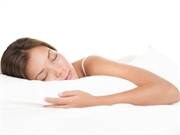- The Best Time of Day to Drink Bone Broth to Maximize Health Benefits
- 8 Ways to Increase Dopamine Naturally
- 7 Best Breads for Maintaining Stable Blood Sugar
- Gelatin vs. Collagen: Which is Best for Skin, Nails, and Joints?
- The Long-Term Effects of Daily Turmeric Supplements on Liver Health
- Could Your Grocery Store Meat Be Causing Recurring UTIs?
- Are You Making This Expensive Thermostat Error This Winter?
- Recognizing the Signs of Hypothyroidism
- 10 Strategies to Overcome Insomnia
- Could Artificial Sweeteners Be Aging the Brain Faster?
Don’t Forget Good Sleep Habits During Summer

Summer means long, carefree days outside, but don’t let that sabotage your slumber, sleep experts say.
An American Academy of Sleep Medicine (AASM) survey found that 36% of U.S. adults said they sleep less in the summer, with the highest rates in the West (42%) and Midwest (40%).
“The lure of the outdoors and more daylight can make it tempting to delay bedtimes, but it’s important to get healthy sleep in every season,” AASM president Dr. Kannan Ramar said in an academy news release.
During the summer, go to bed at a time that allows you to get enough sleep to wake up feeling refreshed and alert. The AASM’s bedtime calculator can help you determine an appropriate bedtime for your schedule.
The AASM also offers the following advice to help avoid sleep loss:
- Keep a consistent sleep schedule. If you tend to stay up later, make sure you allow enough time in bed to get a full night of sleep on a regular basis.
- Turn off your electronic devices 30 minutes to an hour before bedtime. Silence your notifications and charge your devices away from your bed so you’re not tempted to check social media or news alerts.
- Don’t have caffeine after lunch and avoid alcohol near bedtime, as both can disrupt sleep.
- Create a comfortable bedroom environment. Keep your room quiet, dark and a bit cool. To help you fall and stay asleep when days are longer in the summer, consider blackout curtains or a sleep mask.
More information
There’s more about getting enough sleep at the American Academy of Sleep Medicine.
Source: HealthDay
Copyright © 2026 HealthDay. All rights reserved.










